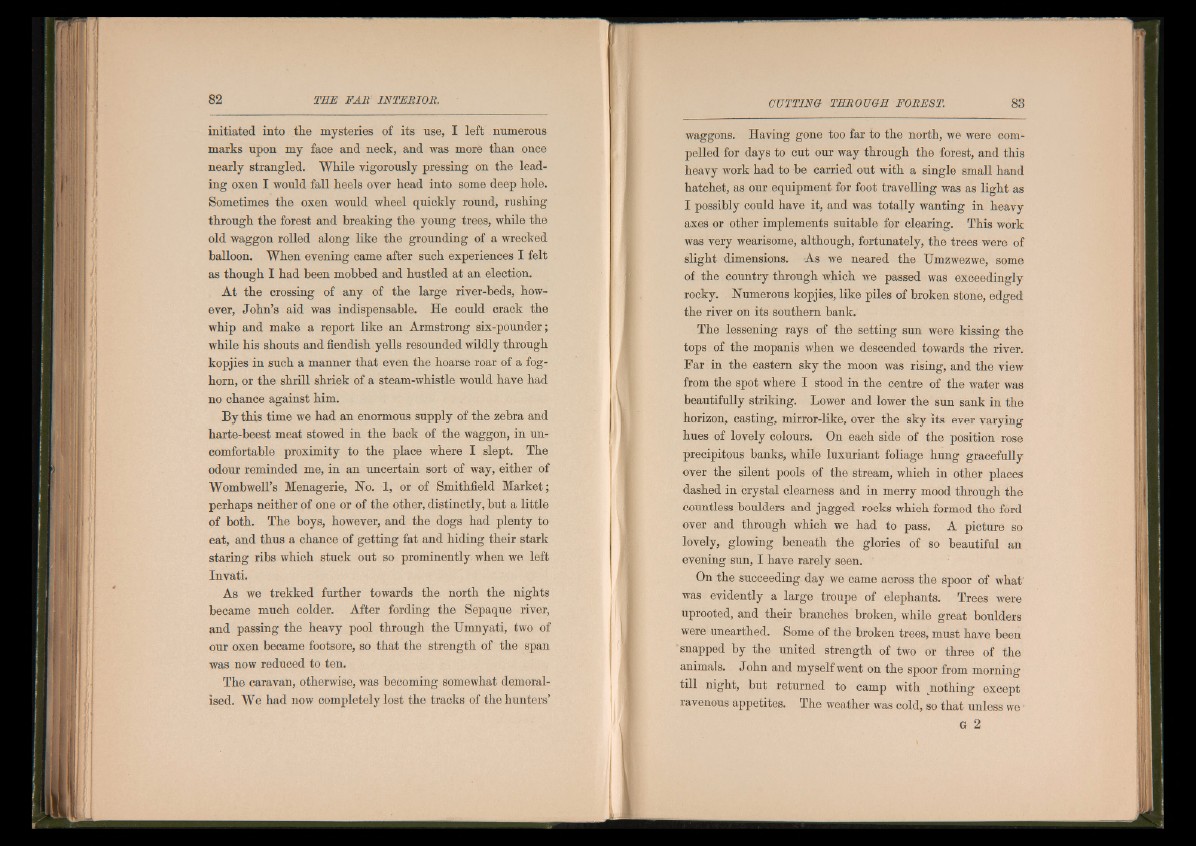
initiated into the mysteries of its use, I left numerous
marks upon my face and neck, and was more than once
nearly strangled. While vigorously pressing on the leading
oxen I would fall heels over head into some deep hole.
Sometimes the oxen would wheel quickly round, rushing
through the forest and breaking the young trees, while the
old waggon rolled along like the grounding of a wrecked
balloon. When evening came after such experiences I felt
as though I had been mobbed and hustled at an election.
At the crossing of any of the large river-beds, however,
John’s aid was indispensable. He could crack the
whip and make a report like an Armstrong six-pounder;
while his shouts and fiendish yells resounded wildly through
kopjies in such a manner that even the hoarse roar of a foghorn,
or the shrill shriek of a steam-whistle would have had
no chance against him.
By this time we had an enormous supply of the zebra and
harte-beest meat stowed in the back of the waggon, in uncomfortable
proximity to the place where I slept. The
odour reminded me, in an uncertain sort of way, either of
Wombwell’s Menagerie, No. 1, or of Smithfield Market;
perhaps neither of one or of the other, distinctly, but a little
of both. The boys, however, and the dogs had plenty to
eat, and thus a chance of getting fat and hiding their stark
staring ribs which stuck out so prominently when we left
Invati.
As we trekked further towards the north the nights
became much colder. After fording the Sepaque river,
and passing the heavy pool through the Umnyati, two of
our oxen became footsore, so that the strength of the span
was now reduced to ten.
The caravan, otherwise, was becoming somewhat demoralised.
Wre had now completely lost the tracks of the hunters’
waggons. Having gone too far to the north, we were compelled
for days to cut our way through the forest, and this
heavy work had to be carried out with a single small hand
hatchet, as our equipment for foot travelling was as light as
I possibly could have it, and was totally wanting in heavy
axes or other implements suitable for clearing. This work
was very wearisome, although, fortunately, the trees were of
slight dimensions. As we neared the Umzwezwe, some
of the country through which we passed was exceedingly
rocky. Numerous kopjies, like piles of broken stone, edged
the river on its southern bank.
The lessening rays of the setting sun were kissing the
tops of the mopanis when we descended towards the river.
Far in the eastern sky the moon was rising, and the view
from the spot where I stood in the centre of the water was
beautifully striking. Lower and lower the sun sank in the
horizon, casting, mirror-like, over the sky its ever varying
hues of lovely colours. On each side of the position rose
precipitous banks, while luxuriant foliage hung gracefully
over the silent pools of the stream, which in other places
dashed in crystal clearness and in merry mood through the
countless boulders and jagged rocks which formed the ford
over and through which we had to pass. A picture so
lovely, glowing beneath the glories of so beautiful an
evening sun, I have rarely seen.
On the succeeding day we came across the spoor of what'
was evidently a large troupe of elephants. Trees were
uprooted, and their branches broken, while great boulders
were unearthed. Some of the broken trees, must have been
snapped by the united strength of two or three of the
animals. John and myself went on the spoor from morning
till night, but returned to camp with nothing except
ravenous appetites. The weather was cold, so that unless we *
G 2